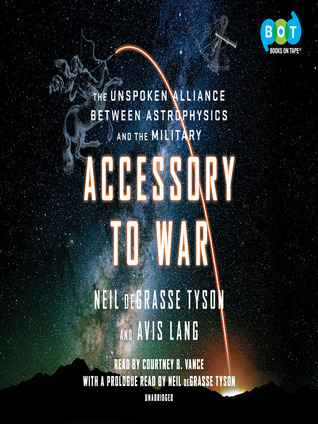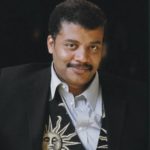 Accessory to War: The Unspoken Alliance Between Astrophysics and the Military
Accessory to War: The Unspoken Alliance Between Astrophysics and the Military by
Neil deGrasse Tyson,
Avis Lang Published by Random House Audio on September 11, 2018
Source: Purchased Genres: History,
Science Length: 18 hrs 38 mins
Format: Audiobook Purchase at
Bookshop.org or Purchase at
Amazon Add on
Goodreads
In this fascinating foray into the millennia-long relationship between science and military power, acclaimed astrophysicist Neil deGrasse Tyson and writer Avis Lang examine how the methods and tools of astrophysics have been enlisted in the service of war. “The overlap is strong, and it’s a two- way street,” say the authors, because the astrophysicists and military planners care about many of the same things: multi-spectral detection, ranging, tracking, imaging, high ground, nuclear fusion, and access to space. Tyson and Lang call it a “curiously complicit” alliance.
Spanning early celestial navigation to satellite-enabled warfare, Accessory to War is a richly researched and provocative examination of the intersection of science, technology, industry, and power that will introduce Tyson’s millions of fans to yet another dimension of how the universe has shaped our lives and our world.
My non-fiction reading really has little rhyme or reason to it. I pick up books that grab my attention or that I’ve seen other people love. I have to admit I don’t really have a huge interest in space exploration or military history, but Neil deGrasse Tyson is a big name and I’ve seen a show or two on tv and at a planetarium that he’s hosted, which is why I picked up Accessory to War.
At times Accessory to War is just fascinating. For me, that was mostly when it was discussing the history of astrophysics and how its beginnings affected armies and explorers and merchants. I also found the parts about how current countries approach space interesting. It’s well-written. It doesn’t talk down to those of us who don’t know much, but it also wasn’t over my head. It was conversational and easy to follow.
Unfortunately, there were other parts that were dry and boring. Lists of treaties and resolutions or companies or countries. It was making its points, but blah.
I listened to the audio, which maybe was part of the problem. I couldn’t skim over anything. Other than that, the narrations was good, clear and with a tone that fit the content.
The connection between the military and science is obvious and clear. Science benefits military and “defense” pays for science. The book was clearly anti-war. The authors prefer science for science’s sake, not to help destroy people/places, which didn’t surprise me.
Overall, Accessory to War was worth my time. It had a lot of information—some I might even remember.
About Avis Lang

Since 2002, Avis Lang has been editing and collaborating with the ubiquitous space advocate Neil deGrasse Tyson, director of the Hayden Planetarium in New York City—initially as the senior editor responsible for his Natural History magazine column, “Universe”; subsequently as the editor of their book Space Chronicles: Facing the Ultimate Frontier (W.W. Norton, 2012); and most recently as coauthor of their book Accessory to War: The Unspoken Alliance Between Astrophysics and the Military (W.W. Norton, 2018).
In 2013, under her own name, Lang published an essay-length ebook, “Somehow, Someday: Prospects for Spacefaring,” intended for the lay reader willing to spend an hour acquiring a few basic ideas about space exploration.
While working in Canada during the 1970s and 1980s as an art historian, essayist, curator, and performer, Lang taught fine arts and women’s studies at the University of British Columbia, Simon Fraser University, the Nova Scotia College of Art and Design, the Banff Centre, and the University of Lethbridge. Her best-known curatorial project was Pork Roasts: 250 Feminist Cartoons (1981), an international traveling exhibition of work by more than a hundred cartoonists from thirteen countries. She now lives in New York City, where she has been an adjunct lecturer in English at the City University of New York and is currently a Research Associate at the Hayden Planetarium.
Website
About Neil deGrasse Tyson

Neil deGrasse Tyson was born and raised in New York City where he was educated in the public schools clear through his graduation from the Bronx High School of Science. Tyson went on to earn his BA in Physics from Harvard and his PhD in Astrophysics from Columbia.
Tyson’s professional research interests are broad, but include star formation, exploding stars, dwarf galaxies, and the structure of our Milky Way. Tyson obtains his data from the Hubble Space Telescope, as well as from telescopes in California, New Mexico, Arizona, and in the Andes Mountains of Chile.
In 2001, Tyson was appointed by President Bush to serve on a 12-member commission that studied the Future of the US Aerospace Industry. The final report was published in 2002 and contained recommendations that would promote a thriving future of transportation, space exploration, and national security.
In 2004, Tyson was once again appointed by President Bush to serve on a 9-member commission on the Implementation of the United States Space Exploration Policy, dubbed the Moon, Mars, and Beyond commission. This group navigated a path by which the new space vision can become a successful part of the American agenda. And in 2006, the head of NASA appointed Tyson to serve on its prestigious Advisory Council, which will help guide NASA through its perennial need to fit its ambitious vision into its restricted budget.
In addition to dozens of professional publications, Dr. Tyson has written, and continues to write for the public. He is a monthly essayist for Natural History magazine under the title Universe. And among Tyson’s eight books is his memoir The Sky is Not the Limit: Adventures of an Urban Astrophysicist; and Origins: Fourteen Billion Years of Cosmic Evolution, co-written with Donald Goldsmith.
Tyson is the recipient of nine honorary doctorates and the NASA Distinguished Public Service Medal. His contributions to the public appreciation of the cosmos have been recognized by the International Astronomical Union in their official naming of asteroid 13123 Tyson.
Tyson is the first occupant of the Frederick P. Rose Directorship of the Hayden Planetarium. Tyson lives in New York City with his wife and two children.
Website | Twitter
 Accessory to War: The Unspoken Alliance Between Astrophysics and the Military by Neil deGrasse Tyson, Avis Lang
Accessory to War: The Unspoken Alliance Between Astrophysics and the Military by Neil deGrasse Tyson, Avis Lang 


I do love nonfiction but this would probably fall on the dry and boring side of things for me.
Maybe if I cared a little more about either space or the military I would have been hooked through the whole thing.
Both subjects do not interest me too, but like you said surprises do happen and the unexpected turns out to be memorable.
Yeah, sometimes I’ll love something that’s totally not what i usually read. In this case, while I didn’t love it, parts of it were definitely interesting.